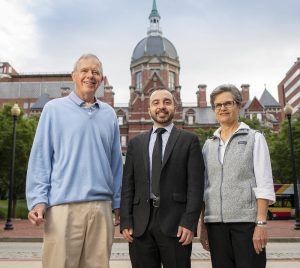This article first appeared in the Wilmer Eye Institute 2018 Annual Report.
David Tolsma has Fuchs’ dystrophy, a rare, progressive wasting away of the inside layers of the cornea. “The cells don’t regenerate, and the dead cells build up. It’s like looking through dirt on a windshield,” Tolsma says.
As an avid golfer and a bird-watcher, Tolsma witnessed a degradation in his sight to the point that it was robbing him of his favorite hobbies. He even had to stop driving at night.
Eventually, the condition grew bad enough that it brought him into the care of Wilmer’s Allen Eghrari, a specialist in corneal transplantation.

In 2016, Eghrari transplanted the first of Tolsma’s waning corneas, his left. His right was replaced the next year. Both surgeries went exceedingly well, Tolsma says. So well, in fact, that Tolsma and his wife, Cynthia, have become donors to Eghrari’s other area of expertise, countering the ravages of Ebola in West Africa.
“The Ebola virus often enters through the eye, and, if the patient is fortunate to survive the disease, there are often serious and long-term eye issues that follow,” Eghrari says.
He is leading a field study in West Africa to catalog and characterize the complications of Ebola on the eye. He has also worked together with Liberian ophthalmologists and nurses to develop innovative experiences with examination equipment, telemedicine, and ophthalmic photography.
Seeing a clear need and an opportunity for real impact, the Tolsmas chose to tackle Ebola instead of the disease that most directly affects them, Fuchs’. “We trusted Dr. Eghrari and wanted him to use the money as he saw best. If the work happened to be in Liberia, it didn’t matter to us,” Tolsma explains. “My wife and I are at a stage where we have become serious givers who want to help people we know in good causes.”
Survivors of Ebola tend to be younger, stronger patients, and they are being treated for cataracts, cornea and other eye problems—care that at times may even restore vision for their long life ahead.
“When you have confidence that the recipients will be well-served and the person providing the service is as great as Dr. Eghrari, it’s a pretty easy decision,” Tolsma says. “We are happy to help in any way we can, especially young people in West Africa.”
For Eghrari, the partnership with the Tolsmas is a perfect example of the good that is possible when like-minded people are united by a common interest and work together in a spirit of unity. “Everyone has the ability to take the initiative, to help people in need and to really make a difference in the world,” Eghrari says.
Interested in supporting innovative research like Eghrari's in the Wilmer Eye Institute?
Topics: Friends of Johns Hopkins Medicine, Johns Hopkins Medicine, Promote and Protect Health